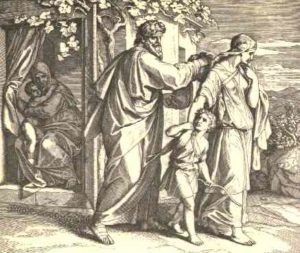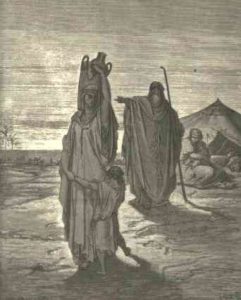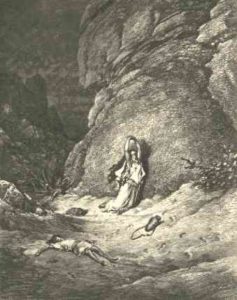Online
Birth of Isaac, Sarah’s joy. (Verse 1-8.)
Ishmael mocks Isaac. (Verse 9-13.)
Hagar and Ishmael are cast forth, They are relieved and comforted by an angel. (Verse 14-21.)
Abimelech’s covenant with Abraham. (Verse 22-34.)
1 And the LORD visited Sarah as he had said, and the LORD did unto Sarah as he had spoken.
[1st Sam 2:21]
2 For Sarah conceived, and bare Abraham a son in his old age, at the set time of which God had spoken to him.
[Gen 17:21, Gen 18:10, Luke 1:13]
3 And Abraham called the name of his son that was born unto him, whom Sarah bare to him, Isaac.
[Matt 1:2]
4 And Abraham circumcised his son Isaac being eight days old, as God had commanded him.
[Gen 17:12, Lev 12:3, Acts 7:8, Phil 3:5]
5 And Abraham was an hundred years old, when his son Isaac was born unto him.
Isaac name means to laugh (as Sarah and Abraham both did). Notice that Isaac, not Ishmael, is circumcised on the eighth day after his birth beginning a biblical tradition that is still practiced unto this day.
This was commanded by God to Abraham but all who were circumcised on that day were too old to completely fulfill God’s word. Ishmael was already thirteen when this command was given to Abraham. Isaac and the Messiah each had miraculous births.
6 And Sarah said, God hath made me to laugh, so that all that hear will laugh with me.
[Gen 17:17, Gen 18:12]
7 And she said, Who would have said unto Abraham, that Sarah should have given children suck? for I have born him a son in his old age.
8 And the child grew, and was weaned: and Abraham made a great feast the same day that Isaac was weaned.
9 And Sarah saw the son of Hagar the Egyptian, which she had born unto Abraham, mocking.
[Gal 4:29]
“mocking” – remember God’s command in 16:9! – Ishmael was at least thirteen years old at this point (see 17:25 and then compare 16:16 with 21:5)
10 Wherefore she said unto Abraham, Cast out this bondwoman and her son: for the son of this bondwoman shall not be heir with my son, even with Isaac.
[Gal 4:30]

11 And the thing was very grievous in Abraham’s sight because of his son.
Ishmael, who was half Egyptian, began the persecution of Abraham’s seed on this day and it would last another four thousand years.
Sarah had no idea that day of the significance of her words, Hagar had earlier mocked Sarah after Ishmael was born and Abraham, as scripture records, believed Ishmael would be the heir until God corrected him.
This no doubt caused much strife between these two ladies. Hagar also taught Ishmael to hate by her example of hating her mistress, and look at what that has led to today.
Hagar must have become very worried at the birth of this child because he would become the one to replace Ishmael as the heir and Sarah made the comment that Ishmael would not even get a share of the inheritance. Amazing!
12 And God said unto Abraham, Let it not be grievous in thy sight because of the lad, and because of thy bondwoman; in all that Sarah hath said unto thee, hearken unto her voice; for in Isaac shall thy seed be called.
[Rom 9:7, Gal 3:16, Heb 11:18]
13 And also of the son of the bondwoman will I make a nation, because he is thy seed.
14 And Abraham rose up early in the morning, and took bread, and a bottle of water, and gave it unto Hagar, putting it on her shoulder, and the child, and sent her away: and she departed, and wandered in the wilderness of Beersheba.
[Gen 25:6]
Some bread and some water was all that Hagar received and no inheritance remained for Ishmael. How this must have caused Hagar to hate Sarah and her seed. This hatred was instilled in the mind of her son and has remained until this day.

15 And the water was spent in the bottle, and she cast the child under one of the shrubs.
[Num 20:5, Psa 63:1]
16 And she went, and sat her down over against him a good way off, as it were a bowshot: for she said, Let me not see the death of the child. And she sat over against him, and lift up her voice, and wept.
[Gen 44:34]
“death of the child” – Hagar is disbelieving God – compare 16:10-12

17 And God heard the voice of the lad; and the angel of God called to Hagar out of heaven, and said unto her, What aileth thee, Hagar? fear not; for God hath heard the voice of the lad where he is.
[2nd Kings 13:4]
18 Arise, lift up the lad, and hold him in thine hand; for I will make him a great nation.
[Gen 17:20]
19 And God opened her eyes, and she saw a well of water; and she went, and filled the bottle with water, and gave the lad drink.
[Num 22:31, 2nd Kings 6:17, Luke 24:16]
20 And God was with the lad; and he grew, and dwelt in the wilderness, and became an archer.
[Gen 39:2]
21 And he dwelt in the wilderness of Paran: and his mother took him a wife out of the land of Egypt.
Ishmael marries an Egyptian which would make his descendants three quarters Egyptian and that percentage would increase as their descendants married other Egyptians.
22 And it came to pass at that time, that Abimelech and Phichol the chief captain of his host spake unto Abraham, saying, God is with thee in all that thou doest:
[Gen 26:28, Isa 8:10]
23 Now therefore swear unto me here by God that thou wilt not deal falsely with me, nor with my son, nor with my son’s son: but according to the kindness that I have done unto thee, thou shalt do unto me, and to the land wherein thou hast sojourned.
[Josh 2:12, 1st Sam 24:21]
“not deal falsely” – Abimelech and Phichol make a league with Abraham but appeal to truth as telling the truth had been a problem in this relationship (see chapter 20)
24 And Abraham said, I will swear.
25 And Abraham reproved Abimelech because of a well of water, which Abimelech’s servants had violently taken away.
[Gen 26:15]
26 And Abimelech said, I wot not who hath done this thing: neither didst thou tell me, neither yet heard I of it, but to day.
27 And Abraham took sheep and oxen, and gave them unto Abimelech; and both of them made a covenant.
[Gen 26:28]
28 And Abraham set seven ewe lambs of the flock by themselves.
29 And Abimelech said unto Abraham, What mean these seven ewe lambs which thou hast set by themselves?
[Gen 33:9]
30 And he said, For these seven ewe lambs shalt thou take of my hand, that they may be a witness unto me, that I have digged this well.
[Gen 31:48]
31 Wherefore he called that place Beersheba; because there they sware both of them.
[Gen 26:18, Gen 26:31]
“Beersheba” means “the well of the oath”
32 Thus they made a covenant at Beersheba: then Abimelech rose up, and Phichol the chief captain of his host, and they returned into the land of the Philistines.
33 And Abraham planted a grove in Beersheba, and called there on the name of the LORD, the everlasting God.
34 And Abraham sojourned in the Philistines’ land many days.
Commentary by Matthew Henry, 1710.
Verse 1-8 – Few under the Old Testament were brought into the world with such expectations as Isaac. He was in this a type of Christ, that Seed which the holy God so long promised, and holy men so long expected. He was born according to the promise, at the set time of which God had spoken. God’s promised mercies will certainly come at the time which He sets, and that is the best time. Isaac means “laughter,” and there was good reason for the name, ch. 17:17. 18:13. When the Sun of comfort is risen upon the soul, it is good to remember how welcome the dawning of the day was. When Sarah received the promise, she laughed with distrust and doubt. When God gives us the mercies we began to despair of, we ought to remember with sorrow and shame our sinful distrust of his power and promise, when we were in pursuit of them. This mercy filled Sarah with joy and wonder. God’s favours to his covenant people are such as surpass their own and others’ thoughts and expectations: who could imagine that he should do so much for those that deserve so little, nay, for those that deserve so ill? Who would have said that God should send his Son to die for us, his Spirit to make us holy, his angels to attend us? Who would have said that such great sins should be pardoned, such mean services accepted, and such worthless worms taken into covenant? A short account of Isaac’s infancy is given. God’s blessing upon the nursing of children, and the preservation of them through the perils of the infant age, are to be acknowledged as signal instances of the care and tenderness of the Divine providence. See Psalms 22:9,10. Hosea 11:1,2.
Verse 9-13 – Let us not overlook the manner in which this family matter instructs us not to rest in outward privileges, or in our own doings. And let us seek the blessings of the new covenant by faith in its Divine Surety. Ishmael’s conduct was persecution, being done in profane contempt of the covenant and promise, and with malice against Isaac. God takes notice of what children say and do in their play; and will reckon with them, if they say or do amiss, though their parents do not. Mocking is a great sin, and very provoking to God. And the children of promise must expect to be mocked. Abraham was grieved that Ishmael should misbehave, and Sarah demand so severe a punishment. But God showed him that Isaac must be the father of the promised Seed; therefore, send Ishmael away, lest he corrupt the manners, or try to take the rights of Isaac. The covenant seed of Abraham must be a people by themselves, not mingled with those who were out of covenant: Sarah little thought of this; but God turned aright what she said.
Verse 14-21 – If Hagar and Ishmael had behaved well in Abraham’s family, they might have continued there; but they were justly punished. By abusing privileges, we forfeit them. Those who know not when they are well off, will be made to know the worth of mercies by the want of them. They were brought to distress in the wilderness. It is not said that the provisions were spent, or that Abraham sent them away without money. But the water was spent; and having lost their way, in that hot climate Ishmael was soon overcome with fatigue and thirst. God’s readiness to help us when we are in trouble, must not slacken, but quicken our endeavours to help ourselves. The promise concerning her son is repeated, as a reason why Hagar should bestir herself to help him. It should engage our care and pains about children and young people, to consider that we know not what great use God has designed them for, and may make of them. The angel directs her to a present supply. Many who have reason to be comforted, go mourning from day to day, because they do not see the reason they have for comfort. There is a well of water near them in the covenant of grace, but they are not aware of it, till the same God that opened their eyes to see their wound, opens them to see their remedy. Paran was a wild place, fit for a wild man; such as Ishmael. Those who are born after the flesh, take up with the wilderness of this world, while the children of the promise aim at the heavenly Canaan, and cannot be at rest till they are there. Yet God was with the lad; his outward welfare was owing to this.
Verse 22-34 – Abimelech felt sure that the promises of God would be fulfilled to Abraham. It is wise to connect ourselves with those who are blessed of God; and we ought to requite kindness to those who have been kind to us. Wells of water are scarce and valuable in eastern countries. Abraham took care to have his title to the well allowed, to prevent disputes in future. No more can be expected from an honest man than that he be ready to do right, as soon as he knows he has done wrong. Abraham, being now in a good neighbourhood, stayed a great while there. There he made, not only a constant practice, but an open profession of his religion. There he called on the name of the Lord, as the everlasting God; probably in the grove he planted, which was his place of prayer. Abraham kept up public worship, in which his neighbours might join. Good men should do all they can to make others so. Wherever we sojourn, we must neither neglect nor be ashamed of the worship of Jehovah.
